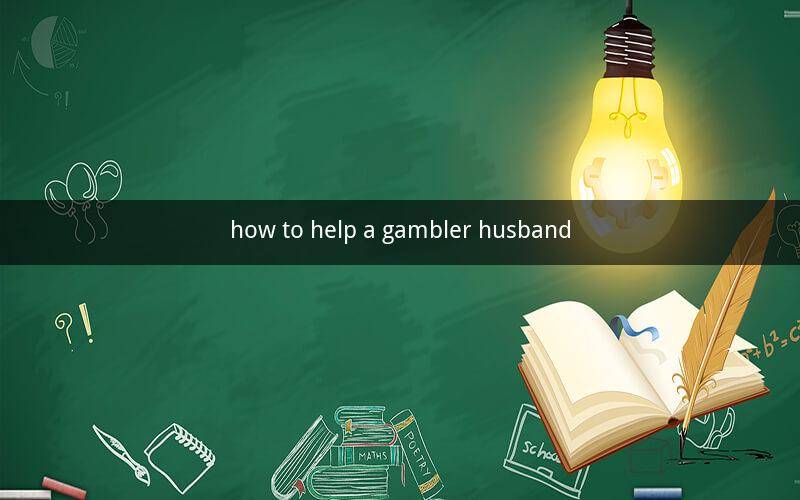
Table of Contents
1. Understanding the Problem
2. Communication and Support
3. Encouraging Professional Help
4. Setting Boundaries
5. Financial Management
6. Creating a Safe Environment
7. Educational Resources
8. Supporting the Entire Family
9. Coping with Relapse
10. Maintaining Long-Term Support
---
1. Understanding the Problem
The first step in helping a gambler husband is to understand the nature of his addiction. Compulsive gambling is a behavioral addiction characterized by an inability to control the urge to gamble, despite negative consequences. It is essential to recognize that gambling is not just a hobby; it is a disease that can have severe impacts on the individual's life and the lives of those around them.
2. Communication and Support
Open and honest communication is crucial. Encourage your husband to share his feelings and experiences without judgment. Be a supportive listener, offering empathy and understanding. It's important to express your concerns about his gambling habits, but avoid confrontational language that may lead to defensiveness.
3. Encouraging Professional Help
Professional help can make a significant difference. Suggest that your husband seek therapy or counseling from a qualified professional who specializes in gambling addiction. This could be a psychologist, counselor, or therapist with experience in dealing with compulsive gamblers.
4. Setting Boundaries
Establish clear boundaries to protect both yourself and your husband. This may include setting limits on financial access, limiting the time spent on gambling activities, or even removing access to gambling websites and apps. Be firm but understanding in enforcing these boundaries.
5. Financial Management
Gambling addiction often leads to financial strain. Take control of the family's finances to prevent further debt and to ensure the well-being of your household. This might involve budgeting, setting aside funds for necessary expenses, and possibly seeking financial counseling.
6. Creating a Safe Environment
A supportive home environment is vital for recovery. Encourage activities that do not involve gambling and that foster a sense of normalcy. This could include family outings, hobbies, or social events that provide a healthy alternative to gambling.
7. Educational Resources
Educate yourself and your husband about gambling addiction. Understanding the disease can help both of you recognize the signs of relapse and develop strategies to cope with triggers. There are numerous resources available online, in books, and through support groups.
8. Supporting the Entire Family
The entire family is affected by a gambler's addiction. Seek support for yourself as well. Joining a support group for families of gamblers can provide you with valuable insights and emotional support. It's important to address the impact on children and other family members, too.
9. Coping with Relapse
Relapse is a common part of the recovery process. If your husband relapses, remain supportive and encourage him to seek help immediately. Understand that relapse does not mean the end of recovery; it is an opportunity to learn and grow.
10. Maintaining Long-Term Support
Long-term support is essential for maintaining recovery. Continue to be there for your husband, even after he has made progress. Encourage him to stay connected with support groups and therapy, and continue to offer your love and understanding.
---
10 Questions and Answers
Question 1: How can I help my husband admit he has a problem?
Answer: Encourage him to seek help from a professional who can provide a safe space for him to express his feelings and recognize the impact of his gambling.
Question 2: What if my husband refuses to seek help?
Answer: Continue to offer support and education about gambling addiction. You may also consider seeking help for yourself to cope with the situation.
Question 3: How do I handle financial issues caused by my husband's gambling?
Answer: Take control of the family's finances, seek financial counseling, and set clear boundaries to prevent further financial strain.
Question 4: Can gambling addiction be cured?
Answer: While there is no cure for gambling addiction, it can be effectively managed with proper treatment and support.
Question 5: What should I do if my husband starts gambling again?
Answer: Remain supportive and encourage him to seek help immediately. Avoid confrontational language and focus on offering empathy.
Question 6: How can I support my children who are affected by my husband's gambling?
Answer: Provide a stable and loving environment, talk to them about the situation, and seek professional help if necessary.
Question 7: Is it possible for a gambler to recover completely?
Answer: Yes, with the right treatment and support, many individuals with gambling addiction can achieve long-term recovery.
Question 8: How can I maintain my own mental health during this difficult time?
Answer: Seek support from friends, family, or support groups. Engage in self-care activities and consider therapy if needed.
Question 9: Can a gambler's addiction lead to legal issues?
Answer: Yes, gambling addiction can lead to legal problems, such as fraud or embezzlement, due to the need to fund gambling habits.
Question 10: What can I do to help my husband avoid triggers that lead to gambling?
Answer: Encourage him to avoid situations that may trigger his gambling urge, such as visiting casinos or places where gambling is common. Engage in activities that distract from the temptation to gamble.